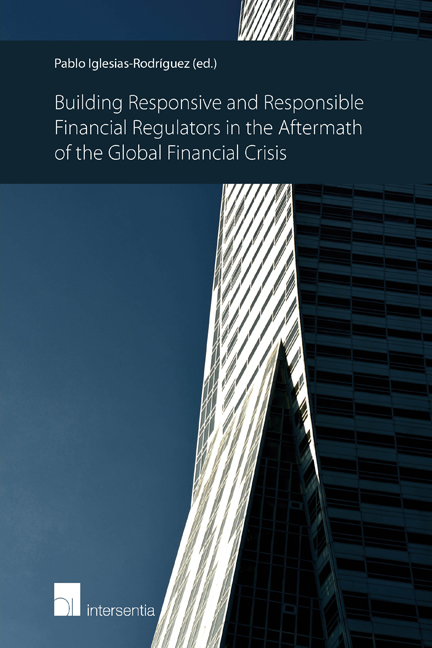Book contents
- Frontmatter
- Preface and acknowledgements
- Foreword
- Contents
- List of contributors
- Responsive-and-responsible financial regulation in the aftermath of the global financial crisis
- Part I THE CONTRIBUTION OF ACCOUNTABILITY, INDEPENDENCE AND ECONOMIC THEORY TO RESPONSIVE-AND-RESPONSIBLE FINANCIAL REGULATION
- Part II POST-CRISIS ARCHITECTURES OF FINANCIAL REGULATION IN THE EUROPEAN UNION, THE UNITED STATES OF AMERICA AND CANADA: ACCOUNTABILITY AND RESPONSIVENESSAND- RESPONSIBILITY
- Part II. 1 THE EUROPEAN UNION
- Part II. 2 THE UNITED STATES OF AMERICA
- Part II. 3 CANADA
Foreword
Published online by Cambridge University Press: 26 November 2017
- Frontmatter
- Preface and acknowledgements
- Foreword
- Contents
- List of contributors
- Responsive-and-responsible financial regulation in the aftermath of the global financial crisis
- Part I THE CONTRIBUTION OF ACCOUNTABILITY, INDEPENDENCE AND ECONOMIC THEORY TO RESPONSIVE-AND-RESPONSIBLE FINANCIAL REGULATION
- Part II POST-CRISIS ARCHITECTURES OF FINANCIAL REGULATION IN THE EUROPEAN UNION, THE UNITED STATES OF AMERICA AND CANADA: ACCOUNTABILITY AND RESPONSIVENESSAND- RESPONSIBILITY
- Part II. 1 THE EUROPEAN UNION
- Part II. 2 THE UNITED STATES OF AMERICA
- Part II. 3 CANADA
Summary
This book addresses the question of how to build more responsive and responsible financial regulators in the aftermath of the global financial crisis. It provides a insightful and critical analysis of the accountability of key financial regulators in the European Union, the United States of America and Canada, in the post-crisis institutional setting. The book shows that whereas the regulatory overhaul that followed the crisis has generally encompassed a move towards a greater responsiveness of financial regulators, the financial architectures of the post-crisis institutional setting still face important challenges.
The challenges that lie ahead are not of a pure architectural or technical nature; they are closely related to fundamental issues of democratic legitimacy and the rule of law. The financial crisis has shown that financial regulators are powerful actors who have a vital role to play in the global society of the 21th century. They only can effectively contribute to the efficiency and the stability of the financial markets if they are able to fulfil their supervisory and regulatory tasks independent from the one-sided interests of financial enterprises as well as the erratic whims of daily party politics. On the other hand financial regulators should not be isolated from society. They have to give an account on the fulfilling of their mandate to the government, the parliament as well as to the society at large. Experience shows that these vital principles – independence and accountability – are in practice not always easy to reconcile.
This book incisively re-examines the concepts of accountability and independence as the indispensable pillars of the governance of the modern financial regulators. It strongly underlines that the accountability, the independence and, more generally, the good governance of financial regulators, constitute necessary conditions for both the efficiency and legitimacy of the financial regulatory and supervisory functions. A proper accountability framework contributes to the creation, monitoring and enforcement of rules that enhance the soundness of the financial markets, financial stability, investor protection and, ultimately, social development. An important additional value of the book is that its scope is not limited to the European Union and its member states. It also includes the role of financial regulators in leading western countries like the United States and Canada where the economic circumstances partly seem different from what is at stake in the European Union.
- Type
- Chapter
- Information
- Building Responsive and Responsible Financial Regulators in the Aftermath of the Global Financial Crisis , pp. vii - viiiPublisher: IntersentiaPrint publication year: 2015

